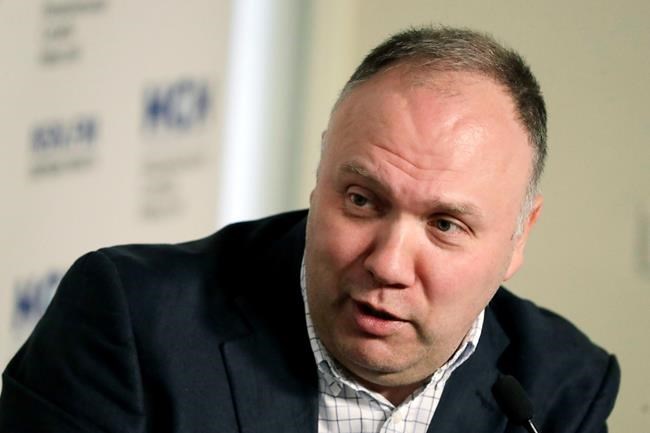
Georgiy Fedorov, head of centre of political studies, speaks during a news conference in Moscow, Russia, Friday, Sept. 4, 2020. Russian pro-governmental political experts held the presser on Friday to discuss the situation with Russian opposition leader Alexei Navalny and what German authorities say was a poisoning with a chemical nerve agent. (AP Photo/Pavel Golovkin)
Republished September 04, 2020 - 10:44 AM
Original Publication Date September 04, 2020 - 5:51 AM
BRUSSELS - NATO Secretary-General Jens Stoltenberg on Friday condemned the “appalling assassination attempt” on Russian opposition politician Alexei Navalny and called on Moscow to answer questions about the poisoning to international investigators.
Navalny, a Kremlin critic and corruption investigator, fell ill on a flight to Moscow on Aug. 20 and was taken to a hospital in the Siberian city of Omsk. He has been in an induced coma in a Berlin hospital since he was flown to Germany for treatment more than a week ago.
German authorities have said that tests showed that he had been poisoned with a chemical nerve agent from the Novichok group. British authorities previously identified the Soviet-era Novichok as the poison used on former Russian spy Sergei Skripal and his daughter in England in 2018.
“There is proof beyond doubt that Mr. Navalny was poisoned using a military-grade nerve agent from the Novichok group. The use of such a weapon is horrific,” Stoltenberg said after chairing a meeting of NATO ambassadors during which Germany briefed its allies on developments.
“Any use of chemical weapons shows a total disrespect for human lives and is an unacceptable breach of international norms and rules. NATO allies agree that Russia now has serious questions it must answer,” he told reporters.
Stoltenberg said Moscow must co-operate with the international chemical weapons organization in “an impartial, international investigation” and provide information about its Novichok program.
After the March 2018 attack on the Skripals in the English city of Salisbury — territory of a member of the 30-nation alliance — NATO withdrew the accreditation of seven staff members at Russia’s mission to the military alliance and rejected the applications of three others. No such action was announced Friday.
Russian authorities have appeared reluctant to investigate what caused Navalny's condition, saying there had so far been no grounds for a criminal investigation. Interior Minister Vladimir Kolokoltsev said Friday that a preliminary inquiry was ongoing, but added that he saw no signs of a crime in what happened to the most determined critic of Russian President Vladimir Putin.
Putin’s spokesman has brushed off allegations that the Kremlin was involved in poisoning Navalny and said Thursday that Germany hadn't provided Moscow with any evidence about the politician's condition.
“We have nothing to hide,” Russian Foreign Minister Sergey Lavrov said Friday, asserting that German authorities had stonewalled Russian requests for information.
Lavrov said the failure to provide information about Navalny’s poisoning could indicate a lack of evidence.
“Our Western partners allow themselves to make arrogant demands in such a tone that suggests that they have nothing but pathos to put on the table,” he said.
Earlier Friday, German government spokesman Steffen Seibert insisted it was up to Moscow to answer questions about what had happened to Navalny.
“Russia has information about the poison attack or can obtain them, not us,” he told reporters in Berlin.
“Numerous samples were taken in Russia, and objects were seized,” Seibert said. “We expect the Russian government to explain itself in this case.”
Berlin prosecutor’s office said judicial authorities in the German capital were examining a request for information from Russian law enforcement and would decide whether to grant it, if necessary in consultation with German federal authorities. It didn’t specify how long a decision might take.
The foreign ministers of Germany and France said Russia had the first responsibility to investigate what they described as a “deeply shocking” case.
“Those responsible for this despicable act must be found and put on trial,” Germany's Heiko Maas and France's Jean-Yves Le Drian said in a statement Friday.
The two foreign ministers also called on Moscow to guarantee the rights of Russian citizens to exert their civil and political rights, noting that the alleged poisoning of Navalny wasn't the first attack on opposition figures in Russia.
Le Drian later told reporters during a news conference that Russia must “explain the facts, with transparency, so that everyone can be informed.” He said that France would work with Germany, which holds the EU presidency, “to take the necessary measures for Russia to explain itself.”
___
Daria Litvinova and Vladimir Isachenkov in Moscow, Geir Moulson and Frank Jordans in Berlin, and Elaine Ganley in Paris, contributed to this report.
News from © The Associated Press, 2020